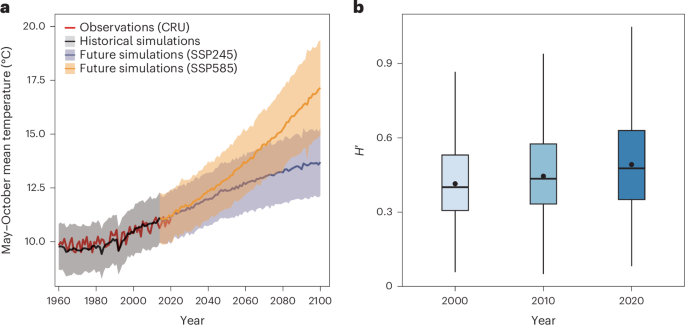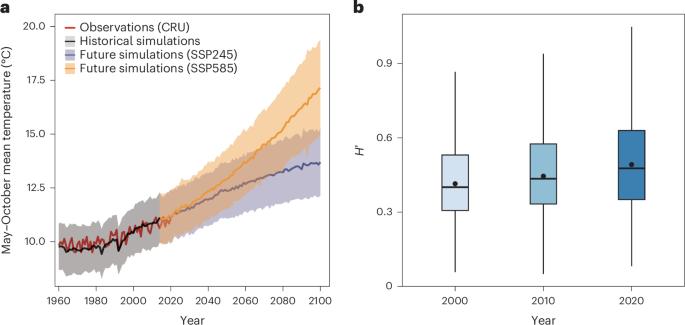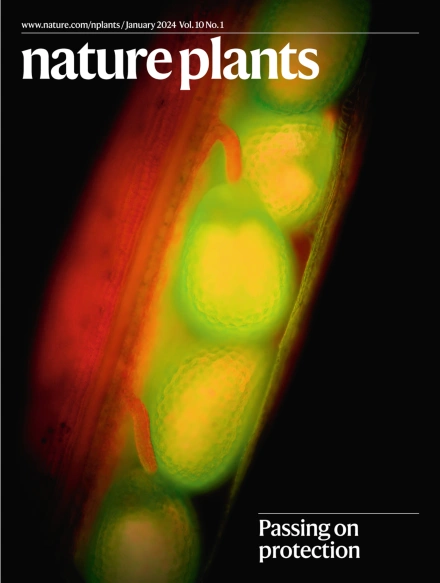Boreal tree species diversity increases with global warming but is reversed by extremes
IF 15.8
1区 生物学
Q1 PLANT SCIENCES
引用次数: 0
Abstract
Tree species diversity is essential to sustaining stable forest ecosystem functioning. However, it remains unclear how boreal tree species diversity has changed in response to climate change and how it is associated with productivity and the temporal stability of boreal forest ecosystems. By combining 5,312 field observations and 55,560 Landsat images, here we develop a framework to estimate boreal tree species diversity (represented by the Shannon diversity index, H′) for the years 2000, 2010 and 2020. We document an average increase in H′ by 12% from 2000 to 2020 across the boreal forests. This increase accounts for 53% of all boreal forest areas and mainly occurs in the eastern forest–boreal transition region, the Okhotsk–Manchurian taiga and the Scandinavian–Russian taiga. Tree species diversity responds positively to increasing temperatures, but the relationship is weakened for higher temperature changes, and in areas of extreme warming (>0.065 °C yr−1), a negative impact on tree species diversity is found. We further show that the observed spatiotemporal increase in diversity is significantly associated with increased productivity and temporal stability of boreal forest biomass. Our results highlight climate-warming-driven increases in boreal tree species diversity that positively affect boreal ecosystem functioning but are countered in areas of extreme warming. This study shows that global warming has had an overall positive effect on boreal tree species diversity over recent decades, but a negative effect in areas of extreme warming, with substantial implications for the productivity and temporal stability of boreal forest ecosystems.


北方树木物种多样性随全球变暖而增加,但因极端天气而逆转
树种多样性对于维持稳定的森林生态系统功能至关重要。然而,目前仍不清楚北方树木物种多样性是如何随着气候变化而变化的,也不清楚它与北方森林生态系统的生产力和时间稳定性是如何相关联的。结合 5312 次实地观测和 55560 幅 Landsat 图像,我们建立了一个框架,用于估算 2000 年、2010 年和 2020 年北方树木物种多样性(用香农多样性指数 H′表示)。根据我们的记录,从 2000 年到 2020 年,整个北方森林的 H′平均增加了 12%。这一增长占北方森林总面积的 53%,主要发生在东部森林-北方过渡区、鄂霍次克-满洲针叶林和斯堪的纳维亚-俄罗斯针叶林。树木物种多样性对温度升高呈正反应,但温度变化越大,这种关系越弱,在极端变暖(0.065 °C/年-1)的地区,树木物种多样性会受到负面影响。我们进一步表明,所观察到的多样性时空增长与北方森林生物量生产力和时间稳定性的提高有显著关联。我们的研究结果突显了气候变暖驱动的北方树木物种多样性的增加对北方生态系统功能的积极影响,但在极端变暖的地区,这种影响会被抵消。
本文章由计算机程序翻译,如有差异,请以英文原文为准。
求助全文
约1分钟内获得全文
求助全文
来源期刊

Nature Plants
PLANT SCIENCES-
CiteScore
25.30
自引率
2.20%
发文量
196
期刊介绍:
Nature Plants is an online-only, monthly journal publishing the best research on plants — from their evolution, development, metabolism and environmental interactions to their societal significance.
 求助内容:
求助内容: 应助结果提醒方式:
应助结果提醒方式:


